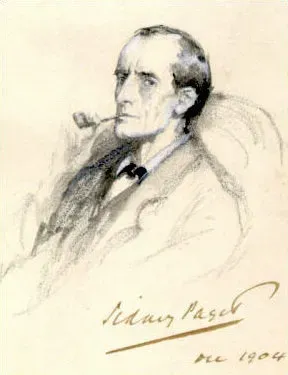Full Name
Sherlock Holmes
Date and Place of Birth
Sherlock Holmes's exact date of birth is not specified in Sir Arthur Conan Doyle's stories, but it is generally understood to be around 1854. He was born in the fictional town of Southsea, England.
Family Background
Sherlock Holmes is the son of a wealthy and respected family. His father, who is not named in the stories, is described as a country squire with substantial landholdings. His mother, who is also not named, comes from a similarly distinguished family. Holmes has a younger brother, Mycroft Holmes, who is also a brilliant intellect but works for the British government in a less public capacity.
Early Life and Education
Sherlock Holmes showed signs of exceptional intelligence and observational skills from a young age. He was educated at home by private tutors before attending an unnamed public school, where he demonstrated an aptitude for solving complex problems. His education continued at the University of Oxford, where he studied medicine, although his interest in chemistry and forensic science often took precedence over his formal medical training.
Nationality
Sherlock Holmes is British.
Career
Sherlock Holmes is renowned as a consulting detective based in London, a role he invented for himself. His career began in the late 19th century and quickly gained prominence due to his extraordinary deductive reasoning skills and keen powers of observation. Holmes is most famously associated with his residence at 221B Baker Street, where he solved numerous high-profile cases, often with the assistance of his friend and chronicler, Dr. John H. Watson. His cases frequently involved intricate puzzles and often required him to employ unconventional methods to arrive at the truth.
Personal Life
Despite his high-profile career, Sherlock Holmes is known for his solitary and reclusive nature. He has a limited social circle, primarily consisting of Dr. Watson and a few other acquaintances. His personal habits include a rigorous daily routine and a peculiar penchant for violin playing, which he uses to stimulate his thinking. Holmes is also known for his use of various disguises, which he employs to gather information and solve cases.
Challenges and Obstacles
Holmes faced numerous challenges throughout his career, including cases that seemed unsolvable and adversaries who were often as intelligent and cunning as he was. His greatest personal challenge was his struggle with boredom and depression when he was not engaged in a case. Holmes's reliance on drugs, particularly cocaine, was another significant obstacle, reflecting his struggle to find stimulation and purpose during periods of inactivity.
Major Accomplishments
Sherlock Holmes's major accomplishments include solving some of the most baffling and notorious cases in criminal history. His successful resolution of cases such as "The Hound of the Baskervilles," "The Adventure of the Speckled Band," and "The Adventure of the Blue Carbuncle" cemented his reputation as one of the greatest detectives. Holmes's methods and techniques in forensic science, such as fingerprint analysis and deduction from physical evidence, were revolutionary and influential in the field of criminal investigation.
Impact and Legacy
Sherlock Holmes has had a profound impact on the genre of detective fiction and popular culture. His character has become synonymous with the detective archetype, influencing countless writers and adaptations. The methodical approach and logical reasoning of Holmes have set the standard for the detective genre. Holmes’s stories have been adapted into numerous films, television series, and radio programs, ensuring his place as a cultural icon.
Quotes and Anecdotes
Some of the most memorable quotes attributed to Sherlock Holmes include:
- "Elementary, my dear Watson." (Though this phrase was never used in this exact form in the original stories, it has become iconic.)
- "When you have eliminated the impossible, whatever remains, however improbable, must be the truth."
- "I am a brain, Watson. The rest of me is a mere appendix."
One notable anecdote involves Holmes’s dramatic confrontation with Professor Moriarty at the Reichenbach Falls, where the detective seemingly met his end. This encounter is one of the most famous in literary history and was later resolved with Holmes's miraculous return to London.
Later Life and Death
Sherlock Holmes's later life is marked by a period of retirement. After his confrontation with Moriarty, Holmes disappeared from public life and retreated to a small farm in Sussex, where he devoted himself to beekeeping and contemplation. His return to detective work was rare, and he remained largely out of the public eye.
Holmes's final appearances in the stories occur in the early 20th century. Although his precise date of death is not recorded in the stories, it is implied that he passed away in the 1920s or 1930s, with his death marking the end of an era for one of literature’s most enduring characters.
Sherlock Holmes remains an enduring symbol of intellectual brilliance and detective prowess, embodying the ideal of the rational, analytical detective. His legacy continues to inspire and captivate audiences around the world.


Comments
Post a Comment